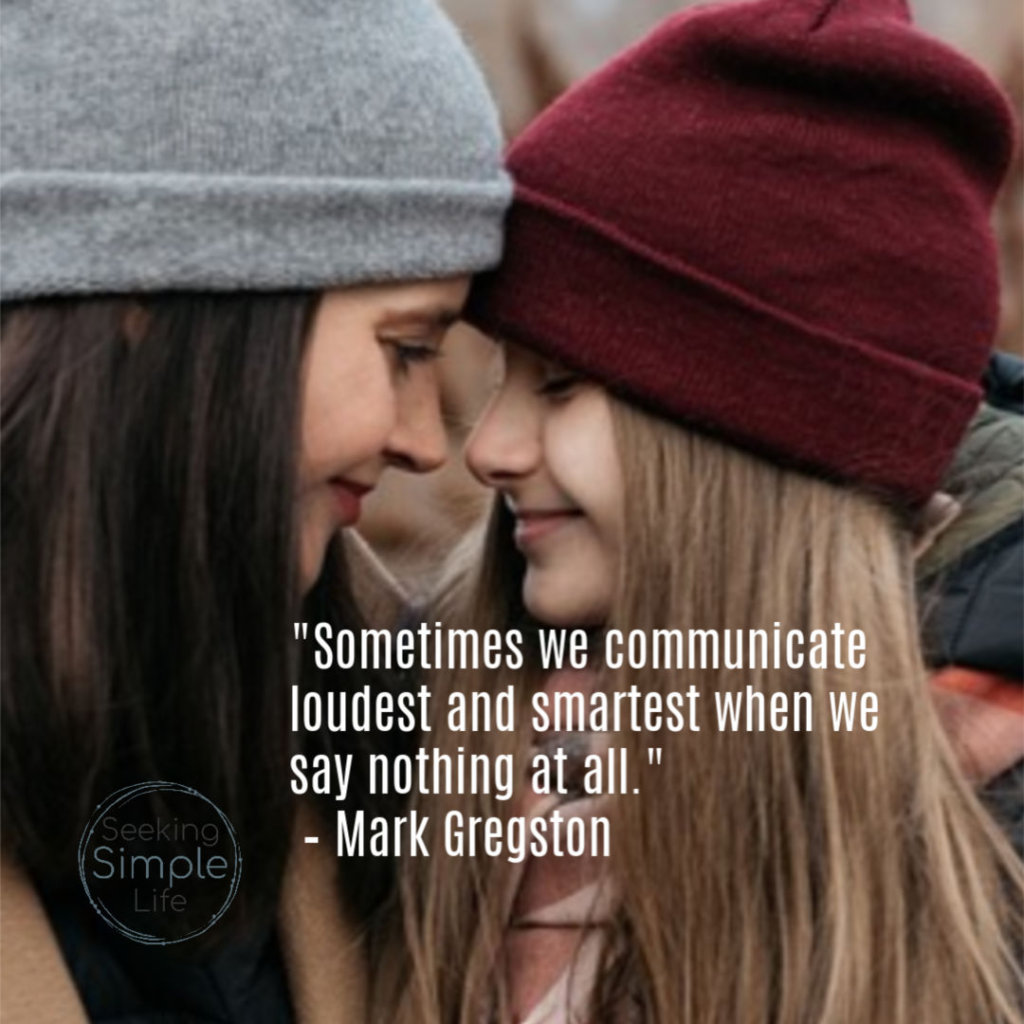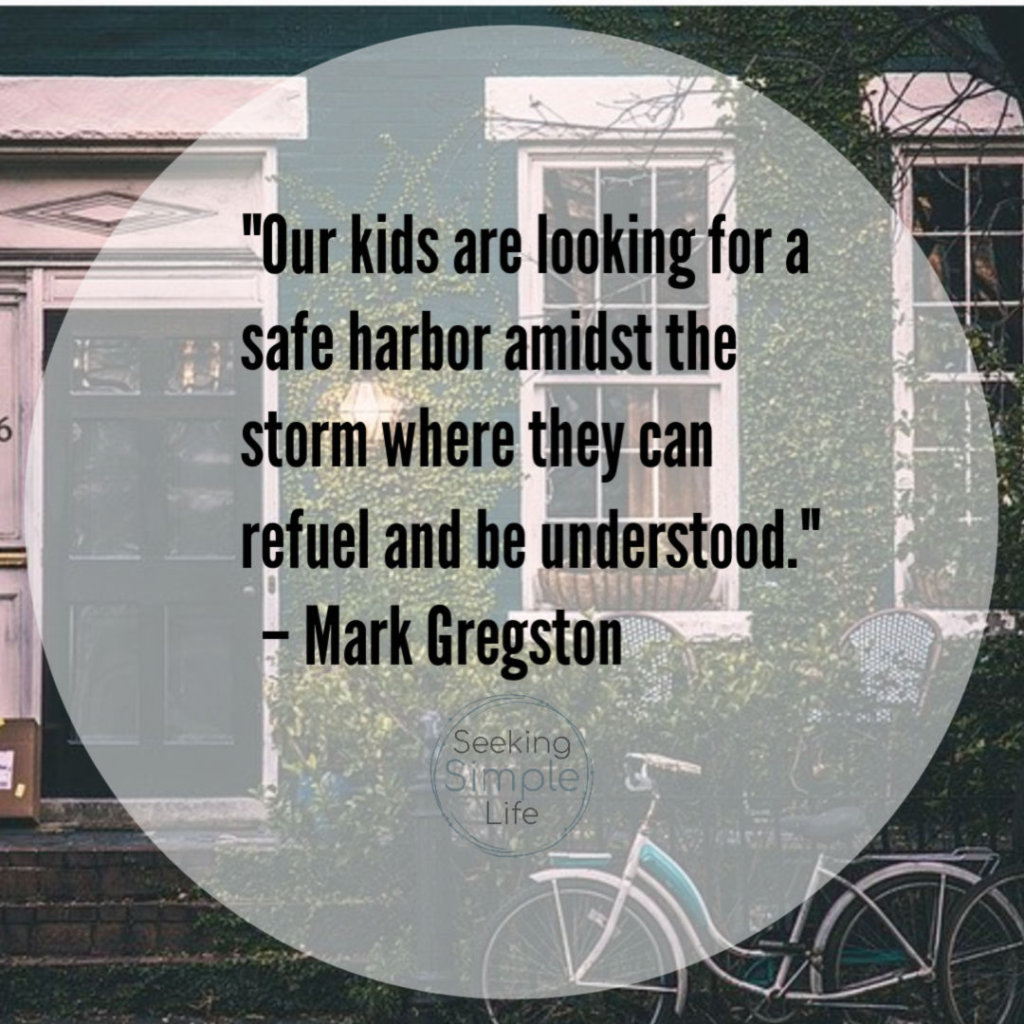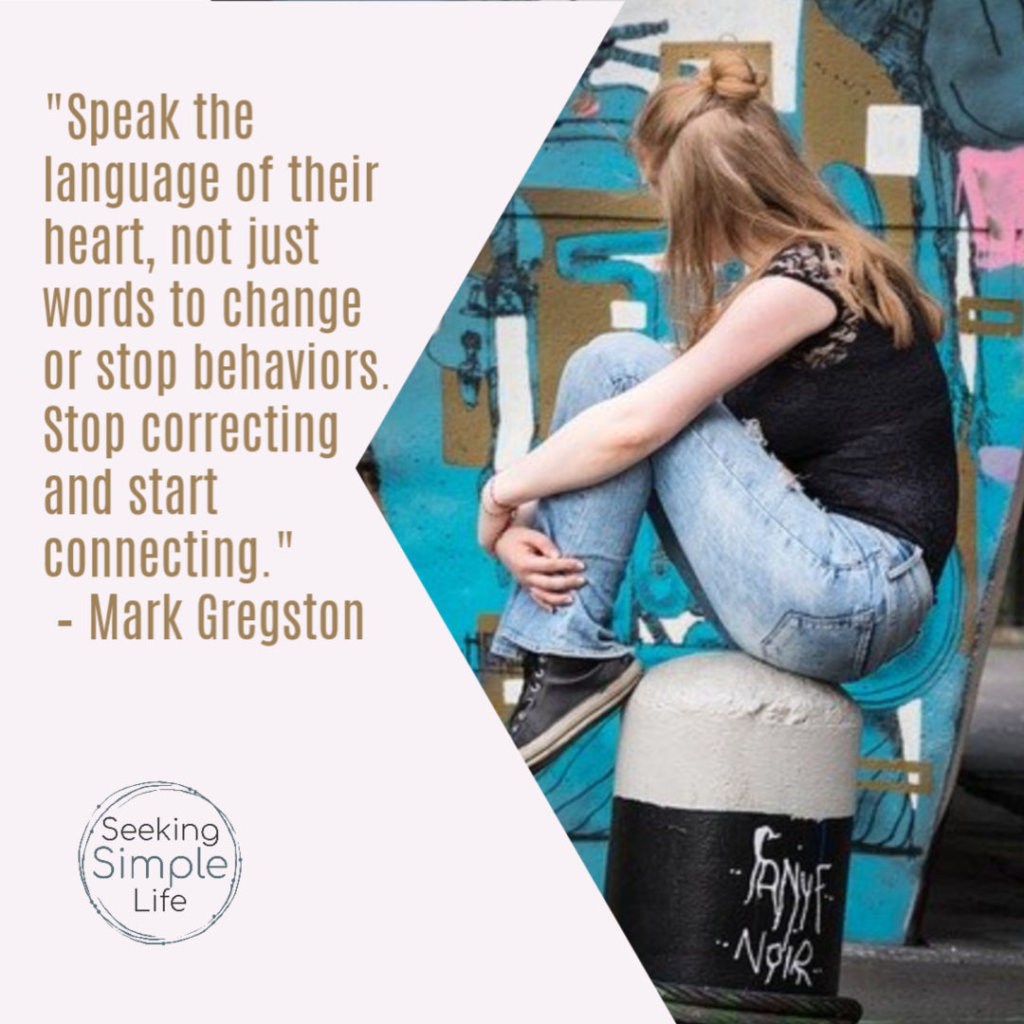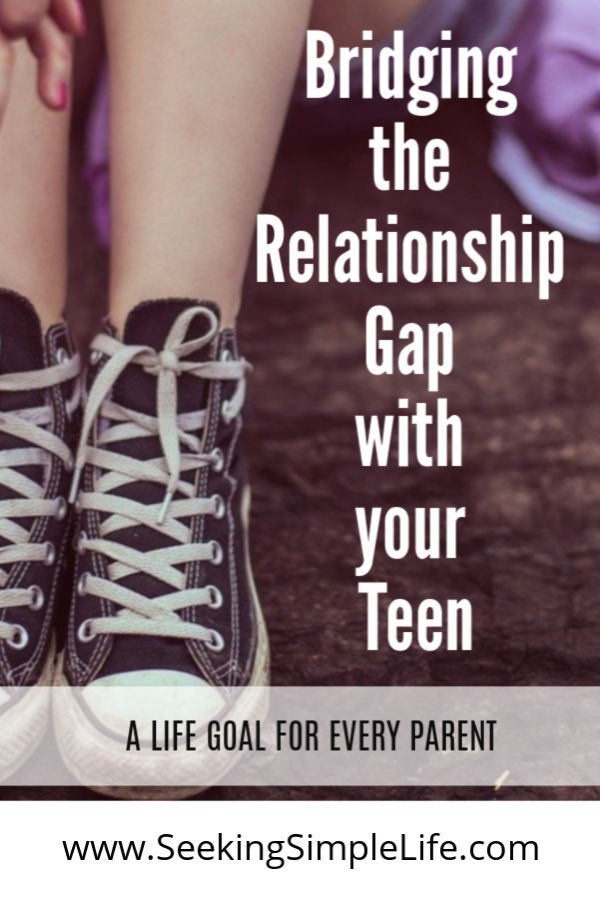
Bridging the Relationship Gap with Your Teen
Are you struggling with your relationship with your teen? You try and try but nothing seems to work? Does it feel like you are banging your head against the wall when you try and talk with them? There are many parents in this exact situation. You aren’t alone. If you are wondering how to start bridging the relationship gap with your teen, you are in the right place. I’m going to explain how to get started and lead you to some valuable resources you can use to keep it going.
Parenting a teenager is completely different than raising a young child. We found this to be extremely true as we were parenting our own children.
We have three very different children and there are 10 years between our oldest and youngest, which means we’ve had to adjust our parenting and pivot many times over the years. One consistent life goal that both my husband and I had was to build strong relationships with our kids.
This wasn’t always easy but we managed to figure it out over the years. You don’t need to struggle to find your way, because expert Mark Gregston wrote a couple of books to help guide us, parents, through the teen years. AND if you have a pre-teen then you can get a little ahead which is a blessing.
Mark gifted me with two books and I’ve used them to advance my own relationship with my kids (even when two are young adults now – it’s never too late) and reflect on how I grew as a parent over the years. It’s my hope that you will find this article helpful to start bridging the relationship gap with your teen and find how to connect with your teen.
(This post may include affiliate links. I only recommend products that I love. All opinions are genuine. Any purchases made don’t cost you any additional money but help me earn a commission. Thank you for helping a girl out! Please read the Disclosure and Privacy Policy for more information.)
Bridging the Relationship Gap with Your Teen
While reading Mark Gregston’s book, Raising Teens In A Contrary Culture, I gathered some valuable nuggets for my parenting journey. There is much, much more valuable information in the book and I highly recommend reading both this book and Mark’s Tough Guys and Drama Queens. Both are packed full of knowledge, insight, and expertise that help parents navigate the teen years.
When trying to bridge the relationship gap with your teen there a few things to consider and more to take action on:
1. Many overestimate the effectiveness of their parenting skills and grossly underestimate the effect of today’s culture.
2. It’s important to retain, that relationship with your teen, no matter what choices they make.
3. A parent’s voice of wisdom gives children the perspective that life is more than just a series of behaviors to be praised or corrected.
4. Sometimes we communicate loudest and smartest when we say nothing at all.
5. Showing interest in your kids isn’t something you do; it must become who you are.
6. Teens long to find sources of wisdom, so they can take all that they’ve learned and determine what they should believe and why they should believe it.
7. Our kids are looking for a safe harbor amidst the storm where they can refuel and be understood.
8. A teen needs to be in the presence of imperfect people as they begin to realize and comprehend that their once-perfect world is just not anymore.
9. Without a relationship, giving unasked for advice creates more distance.
10. Conflict is a true precursor to change.
11. Not every teachable moment needs to have a lesson tied to it.
12. Speak the language of their heart, not just words to change or stop behaviors. Stop correcting and start connecting.
13. It’s imperative that we allow our teens to make decisions and reap the benefits, or suffer the consequences along the way.
14. Effective communication and discussion depend on focusing on others more than yourself.
15. Your relationship with your kids can be the most important relationship they have during their teen years.
The effect of Today’s Culture (#1)
Often times we, as parents, are riding life enjoying the routines and structure we’ve put on our homes. Then our lives slowly get blindsided by chaos, when our child enters the junior high years. Why is that? Mark shows us that it is because we’ve overestimated our parenting skills and underestimated the effect of today’s culture.
Mark points out that today’s culture has a profound disrespect for authority and a lack of respect for one another. Our society frequently feels compelled to criticize others about everything: politicians, pastors, police officers, teachers, businesses, coaches, and parents. The media supports this by consistently depicting these figures as unworthy of respect. Then to top it off Western society encourages voicing disrespect of anything and anyone they don’t agree with. There is more division in society than unity.
When you consider this, and you add it to the vastness of information available for anyone today, through the internet alone, the wisdom that one can gain from someone in authority is often dismissed before it can be given. Now consider the information highway and how many contradicting “facts” are available to anyone today.
I’m going to date myself here. When I grew up there were 3 TV stations and two were the same feed. The computer and the internet weren’t common in homes. The newspaper was local and if we could pick up a radio frequency from far away it was a miracle.
The information available to me, the wisdom available was from those around me. However, for my kids, they have the world at their fingertips: text messages, apps, websites, social media, video streaming and so much more. Their lives are bombarded with information constantly.
Just last night, while we were eating dinner, my daughter received over 80 text and voice messages. All within a 30-minute time-span!
This wouldn’t have happened back when I grew up. Our culture has changed.
Finally, let’s consider social media and the effect it has on our society. It can be positive and has the ability to spread positive messages quickly, but it can also do the exact opposite (many times it does this more than the former). After all, there isn’t a day where my own feed isn’t filled with complaints and criticism.
However social media is also filled with the image of people living the perfect life, looking perfect and seeking to receive constant approval for their filtered messages and pictures. In a world with filters and inauthenticity, it is understandably hard for teens to know who is being real and who is being fake. AND this just adds more confusion.
In the end, learning to bridge the relationship gap with your teen isn’t about criticizing society today. It is seeing today’s culture from a different perspective, learning how today’s culture is affecting your teen, and being able to flex your parenting from a teaching to a coaching method.
It’s Their Decisions, No Matter Hard It Is (#2 thru 4)
The teen years are about exploring what to believe and why to believe it. In a world where the sources of information are conflicting and extremely plentiful, this can lead to some poor decisions. We as parents can stick with the norm of what we did when they were little and tell them what they are doing wrong and how to fix it, but this will just widen the gap.
OR
Maybe we can focus on maintaining our relationship, by showing them unconditional love, even if we don’t agree with the decision they have made.
Do you remember a time when you lost your temper when they were little? You snapped at them and yet they turned to you and gave you the biggest hug, telling you they loved you? At that moment they may not have agreed with your decision to get angry with them. They may not have understood why you were angry with them, but they still showed you, unconditional love.
The teen years are there to help prepare your child for life on their own. It more than just teaching them basic hygiene and housekeeping skills. They must learn how to navigate their lives, knowing when to make decisions and how to grow into the person they are meant to become. They simply can’t do that when parents are telling what they can and can not do.
The voice of wisdom we can bring to our teens is guiding them to think through situations and come up with informed decisions. It isn’t giving them the answers. It is asking them questions so they can discover a new way of thinking that might not be obvious to them.
Often times, just being here to listen to the rant about drama happening is enough to be there for my own child. She’s able to express her frustrations and will often figure out how she wants to handle the situation herself. If she wants my advice she’s learned to ask for it. Lately, she will often bring up previous advice from another situation and tell us how she used it for a different situation. Just us being there to listen speaks volumes to her.
Home Sweet Home (#5 thru 7)
Remember when I brought up the confusing messages around inauthenticity; when social media expects perfect photos and messages about your perfect life? Interestingly enough teens have developed a keen sense for fake people that pretend to want a relationship with them. How did they do that? From trial and error. Pain and heartache. Suffering through confusion then gaining enlightenment.
Are you often too busy to really show interest in what your teen is going through, or are your actions reflecting more of a message of “I’ll fit you in between my other activities”? What message is sent to your child then? Most likely…I’m not worth getting to know.
I get it. I’ve been there. Busy life. Career. House. Kids. Multiple kids.
All.The.Things.
However, your teen craves real relationships. One based upon authenticity and a good-old-fashioned “I want to know who you are”. They want to be heard. They crave a source of wisdom that is consistently available to them, so they can try to sort out the other conflicting information.
Teens want somewhere to vent, express themselves without judgment, and to know that they can have the freedom to be themselves always. The freedom to be kids if they want to play. The freedom to grow and mature all while making mistakes and learning from them.
I learned to be more mindful of my own actions and feelings, so I could be there for my kids when they needed me. I learned to show my true self so that they could see the imperfect me and know that they could be themselves too. Finally, I learned to put down what I was working on so that they knew, without a doubt, that I was listening and I asked questions to learn more about them, so they knew I wanted to know more.
Often our kids would see us and the pent up emotions from their day would spill out. Sometimes it was in the car, but often it was as soon as we entered our home. We had been able to create a safe haven for them.
Perfection and Parenting Don’t Mix Well (#8 thru 10)
We’d all like life to be filled with rainbows and joy all the time. Perfection is beauty according to social media. However, what’s the message being sent to our kids? That they have to be perfect or they might as well give up? That failure is not an option?
As parents, we often are quick to criticize when things are wrong, and we praise them for things they are doing really well. What about showing them how beautiful the in-between journey can be? What about showing them the real you, telling them about the stories of failure, and how you found a different way? After all, parenting perfection is over-rated.
When kids are little their lives are protected by this social bubble, and then when they enter junior high that bubble pops. They discover through trial and error that while they are expected to be perfect outwardly they aren’t sure who they can trust and confide in. Fake news, fake photos, fake relationships…
Their once-perfect world is not-so-perfect and they are floundering trying to make sense of it. Unless they have a lifeline. A safe haven where they know someone (you) that is authentic and imperfect, and that in itself becomes the perfect solution for them.
If you are trying to give the advice, but it’s not welcomed, Mark Gregston gives some valuable tips (Raising Teens In A Contrary Culture) to help you invite communication and bridge the relationship gap with your teen. He admits that conflict is a precursor to change, but that with some action on our part we can make the changes to help our children through their struggles.
Conflict is the Precursor to Change
The first step is trying to understand what’s driving the behavior (without judgment). There are typically 5 drivers behind a behavior:
- Loss – A loss of something that was but now isn’t. A loss of something hoped for that didn’t happen or won’t happen. A loss of something perceived about a life they had, but now it isn’t possible but if it was they wouldn’t be where they are today. Sometimes it’s a loss from being victimized in some way.
- Performance for Acceptance – the natural response of longing to be valued and appreciated, learning ways to gain acceptance and attention.
- Appearance – the need to appear “just right” becomes the utmost importance.
- Masking and Avoidance – fear of being vulnerable and not being able to live up to perceived expectations, avoiding a trauma they experienced, and feeling shamed for expressing themselves.
- Anger and Vengeance – an emotional response driven by the perception of not getting what they want.
The next step is understanding these truths as you navigate through the conflict:
- The most important relationship that your children can have in their teen years is YOU. They will express hate, and you will be hurt by comments. Offer them a relationship with you when they deserve it the least, and that will make a lasting impact, for both of you.
- If you have a discipline problem, you have a relationship problem. Parents need to figure out what is causing the relationship gap. A relationship takes two. Look within and see if you can do something different to strengthen your relationship.
- Teens change because of the relationship, not your authority. Authority is null and void in today’s culture. The only way to the teen’s heart is through the relationship. This doesn’t mean that they have the freedom to disrespect, but you may need to try to reach them a different way than before.
- You can only change one person in this world, YOU. What expectations do you have for your family? How do you react to situations? Do you have an inherent need to control every situation? Are you bridging the gap or building a wall between you and your teen?
Learning Effective Communication (#11 thru 15)
In his book, Mark lovingly reminds us, parents, that if we were constantly criticized for everything at work we wouldn’t like being there. Often teens feel this way at home. We need to find ways to communicate where we are listening to them, guiding them to figure things out for themselves, all while making our relationship more important than the behavior they’ve been showing.
It’s a tricky balance but one this book, Raising Teens In A Contrary Culture, continues to show as possible when we can look at what might be motivating the change in behavior, and then try to adjust how we are reacting to the situation.
What can we do to help give them the safe haven to be able to be themselves?
How can we connect with them beyond just the times of trouble and chaos?
Mark gives us, parents, a few communication pointers:
- Look at your parenting style – do you expect perfection? is it “my way or the highway”?
- Quit correcting all the time.
- Spend more time listening than talking.
- Be okay with extending a conversation over time – “You know, I don’t know…let me think about it.” It gives you both time to learn new perspectives between discussions.
- Ask questions to stimulate them to think deeper.
- Keep the discussion about them, share only when you are asked.
- Every conversation doesn’t have to have a lesson.
- Sometimes silence allows them to discover more about themselves.
Our job as parents is to prepare them for a life outside our home. To do that they will need to learn how to navigate life without us telling them what to do, or how to do it. I don’t know about you, but I really don’t want my kids living on my couch or my basement! As they are going through their teen years, they naturally want to explore and learn how to navigate the world. But it can be confusing and frustrating for them.
By bridging the relationship gap with your teen you are helping give them the consistent source of wisdom they crave. You are giving them a safe haven allowing them the freedom to be themselves. BUT most of all you are showing them, through your actions that being imperfect is the perfect way to grow and become the person they are meant to be.
Before You Go
WANT TO REMEMBER THIS? SAVE BRIDGING THE RELATIONSHIP GAP WITH YOUR TEEN TO YOUR FAVORITE PINTEREST BOARD!










